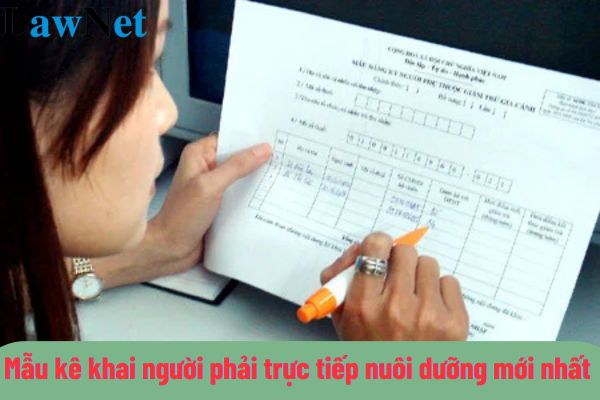What is the definition of personal deduction in personal income tax in Vietnam?
What is the definition of personal deduction in personal income tax in Vietnam?
Under Clause 1, Article 19 of the Law on PIT 2007 amended by Clause 4, Article 1 of the Law on Amendments to Personal Income Tax Law 2012, personal deduction means a sum of money deductible from pre-tax income from business, salary or wage of a resident taxpayer.

What is the definition of personal deduction in personal income tax in Vietnam? (Image from the Internet)
What are the applicable personal deductions in Vietnam?
The current personal deductions are adjusted by Article 1 of Resolution 954/2020/UBTVQH14 as follows:
Personal Deductions
Adjust the personal deductions stipulated in Clause 1, Article 19 of the Law on PIT 2007 No. 04/2007/QH12, which has been amended and supplemented by Law No. 26/2012/QH13 as follows:
1. The deduction for taxpayers is VND 11 million/month (VND 132 million/year);
2. The deduction for each dependent is VND 4.4 million/month.
Thus, the current personal deductions are as follows:
- For taxpayers: VND 11 million/month (VND 132 million/year);
- For each dependent: VND 4.4 million/month.
What are the regulations on persons and grounds to be identified as dependants of taxpayers to have the nurture obligation to claim personal deductions in Vietnam?
Under Clause 3, Article 12 of Decree 65/2013/ND-CP, persons and grounds to be identified as dependants of taxpayers to have the nurture obligation are as follows:
- Under-18 children (including blood children, legally adopted children, step children of spouse);
- Disabled children (including blood children, legally adopted children, step children of spouse) who are aged 18 years or older and incapable of working;
- Children (including blood children, legally adopted children, step children of spouse) who are studying at universities, colleges, professional secondary schools or job-training schools, including children who are aged 18 years or older and are studying at general education level and have no income or have incomes not exceeding the level specified in Clause 4, Article 12 of Decree 65/2013/ND-CP;
- Persons who are beyond the working age or persons who are at the working age prescribed by law but are disabled and incapable of working or have no income or have incomes not exceeding the level specified in Clause 4, Article 12 of Decree 65/2013/ND-CP, including:
+ Spouses of taxpayers;
+ Blood parents or stepfather, stepmother, legally adopted parents, spouse's parents of taxpayers;
+ Other helpless individuals whom taxpayers are obliged to directly nurture.
What are the documents proving dependents for personal deduction in Vietnam?
Under Point g, Clause 1, Article 9 of Circular 111/2013/TT-BTC amended by Article 1 of Circular 79/2022/TT-BTC, the documents required to prove dependents for personal deduction are as follows:
For Children:
- For children under 18 years of age: photocopies of the Certificates of birth and ID cards or Citizen ID cards (if any).
- For children from 18 years of age and over that are disabled and incapable of work:
+ Photocopies of the Certificates of birth and ID cards or Citizen ID cards (if any).
+ Photocopies of Certificates of disability according to regulations of law on the disabled.
- For children in school mentioned in sub-point d.1.3 point d clause 1 of this Article:
+ Photocopies of the Certificates of Birth.
+ Photocopies of the student’s cards or declarations certified by the schools, or other papers proving the study at universities, colleges, high schools or vocational schools.
- For adopted children, illegitimate children, stepchildren: apart from the aforesaid papers, other papers proving the relationship are required, such as photocopies of the decisions on certification of adoption and decisions on recognition of parent or child acknowledgement made by competent authorities.
For spouse:
- A photocopy of the ID or Citizen ID card.
- A photocopy of the written confirmation of residence or notice of personal identification number and citizen information in national population database or another paper issued by the police authority (which proves the husband and wife relationship) or a photocopy of the Certificate of marriage.
If the spouse is of working age, other papers proving the dependant’s incapability of work are required, apart from the aforesaid papers, such as a photocopy of the Certificate of disability according to regulations of law on the disabled that are incapable of works, a photocopy of the medical record of the ill person incapable of work (suffering from AIDS, cancer, chronic kidney failure, etc.).
For parents, parents-in-law, stepparents, legitimate adoptive parents:
- Photocopies of ID cards or Citizen ID cards.
- Legitimate papers proving the relationship between the dependants and the taxpayer such as a photocopy of the written confirmation of residence or notice of personal identification number and citizen information in national population database or another paper issued by the police authority, certificates of birth, decisions on recognition of parent or child acknowledgement made by competent authorities.
If the spouse is of working age, other papers proving the dependant’s incapability of work are required, apart from the aforesaid papers, such as a photocopy of the Certificate of disability according to regulations of law on the disabled that are incapable of works, a photocopy of the medical record of the ill person incapable of work (suffering from AIDS, cancer, chronic kidney failure, etc.).
For other individuals mentioned in sub-point d.4 point d clause 1, Article 9 of Circular 111/2013/TT-BTC, the proving documents include:
- Photocopies of ID cards or Citizen ID cards or certificates of birth.
- Other legitimate papers to determine the custody as prescribed by law.
If the dependants are of working age, other papers proving the dependant’s incapability of work is required, apart from the aforesaid papers, such as the Certificate of disability according to regulations of law on the disabled that are incapable of work, a photocopy of the medical record of the ill person incapable of work (sufferer from AIDS, cancer, chronic kidney failure, etc.)
The legitimate papers mentioned in sub-point g.4.2 point g clause 1 of this Article are any legal document that proves the relationship between the taxpayer and the dependant, such as:
- Photocopies of the papers proving the custody prescribed by law (if any).
- A photocopy of the written confirmation of residence or notice of personal identification number and citizen information in national population database or another paper issued by the police authority.
- A declaration that the dependant is living with the taxpayer, which is made by the taxpayer using the form enclosed with the Circular 80/2021/TT-BTC on elaboration of some Articles of the Law on Tax Administration and the Government’s Decree No. 126/2020/ND-CP dated October 19, 2020 on elaboration of some Articles of the Law on Tax Administration and certified by the People’s Committee of the commune where the taxpayer resides.
- A declaration that the dependant is residing locally and living alone, which is made by the taxpayer using the form enclosed with the Circular 80/2021/TT-BTC on elaboration of some Articles of the Law on Tax Administration and the Government’s Decree 126/2020/ND-CP dated October 19, 2020 on elaboration of some Articles of the Law on Tax Administration and certified by the People’s Committee of the commune where the taxpayer resides.
If the resident is a foreigner, equivalent legal documents proving the dependant are required.
Where the taxpayer working in economic organizations and public services agencies has specified his dependants being his parents, spouse, children, and other dependants in his or her résumé, the documents proving the dependants are the documents mentioned in sub-points g.1, g.2, g.3, g.4 and g.5 point g clause 1 of this Article or only the dependant registration form certified by the head of the unit on the left which is provided in the Circular 80/2021/TT-BTC on elaboration of some Articles of the Law on Tax Administration and the Government’s Decree 126/2020/ND-CP dated October 19, 2020 on elaboration of some Articles of the Law on Tax Administration.
The head of the unit is only responsible for the names of dependants, their years of birth and relationship with the taxpayer. The taxpayer is responsible for other information.
From the date on which the tax authority notifies the taxpayer that the connection with the national population database is completed, the taxpayer is not required to submit the aforesaid documents proving the dependants if the information in such documents has been incorporated into the national population database.










- What is the value-added tax rate for construction in Vietnam from July 1, 2025?
- What is the VAT rate for the production of a 30-second television commercial in Vietnam?
- What are the cases where credit-invoice method is applicable in Vietnam?
- What entities are value-added taxpayers in Vietnam in 2025?
- From July 1, 2025, which business establishments will apply the credit-invoice method in Vietnam?
- What are conditions for VAT refund for new investment projects in Vietnam from July 1, 2025?
- What are regulations on VAT refund for enterprises with expansion projects in Vietnam from July 1, 2025?
- Is the liquor with an alcohol content of 20% or higher subject to excise tax in Vietnam?
- What is the excise tax rate applying to the dance hall service in Vietnam?
- What is the Gregorian date for the 2nd day of the 2025 Tet holiday in Vietnam? Does the deadline for submitting the 2024 financial report of sole proprietorships fall on the 2nd day of Tet?

